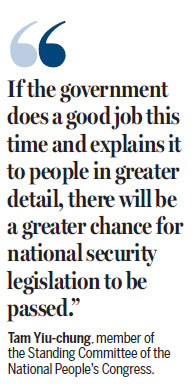Tam: Need for national security legislation looms
Updated: 2018-10-26 07:03
By Joseph Li in Hong Kong(HK Edition)
|
|||||||
NPCSC member says it can be achieved before the CE's term of office expires in 2022
There is a growing need to legislate for Article 23 of the Basic Law to safeguard national security following a string of recent incidents, said Tam Yiu-chung, a Hong Kong member of the Standing Committee of the National People's Congress.
He was referring to the banning of the "Hong Kong National Party" which openly advocates Hong Kong independence, the rejected visa renewal of a foreign journalist and the disqualification of a self-determinist activist from next month's Legislative Council by-election.
Tam believes the special administrative region government should complete the legislative process of the national security law within Chief Executive Carrie Lam Cheng Yuet-ngor's current term of office which expires in 2022. If she wishes to fulfil this goal, she should begin with preparation work for it - in the form of a legislative proposal document or a public consultation, Tam added.
He explained that in 2003, the attempt to legislate Article 23 failed because the overall political climate at the time was adverse. Hong Kong was recovering from the outbreak of the SARS epidemic. It was also suffering from an economic downturn. Many people were misled into thinking that the legislation intended to take away people's rights and freedoms.

If the government does a good job this time and explains it to people in greater detail, Tam believes there will be a greater chance for national security legislation to be passed.
"The chief executive acknowledges and reiterates it is the Hong Kong SAR Government's constitutional responsibility to enact a national security law to protect the country from separatism," Tam told China Daily in an exclusive interview.
"I have noticed a new way of presentation when she delivered the Policy Address (on Oct 10). She said the government would not turn a blind eye to acts of violating the Constitution and the Basic Law, and attempts of seceding from the country. Equally, existing laws that could be used to combat those attempts would not be put aside," Tam noted.
Tam thinks Lam said that in order to ease pressure before a national security law is enacted. "Normally, pressure comes from two directions - from those who oppose legislation, from people who demand legislation and they are becoming rather impatient," Tam ventured.
In the absence of a national security law which covers seven offenses including treason, sedition and secession, Tam suggested the SAR government resort to local laws such as the Societies Ordinance and Crimes Ordinance - although some people noted that these are outdated laws made in the colonial era, which cannot effectively deal with separatism.
"I have heard different views about using existing laws to deal with separatism offenses. Some worry that if people are prosecuted with offenses under the Societies Ordinance and Crimes Ordinance which do not exactly target the seven offenses under Article 23, there is a risk the charges will be thrown out by the court," Tam said.
"I have, however, heard views to the contrary," he continued. "If the courts decide that although the wording of the existing laws is outdated, its spirit is in line with the Basic Law to counter separatism, the courts may rule in favor of the government and convict the offenders."
Tam believes the government can try with the Societies Ordinance and Crimes Ordinance if and when necessary. "Moreover, it is not altogether a very bad thing if the government loses cases in court. If the government loses, it will be prompted to further speed up the legislative process of the national security law," he argued.
joseph@chinadailyhk.com
(HK Edition 10/26/2018 page4)